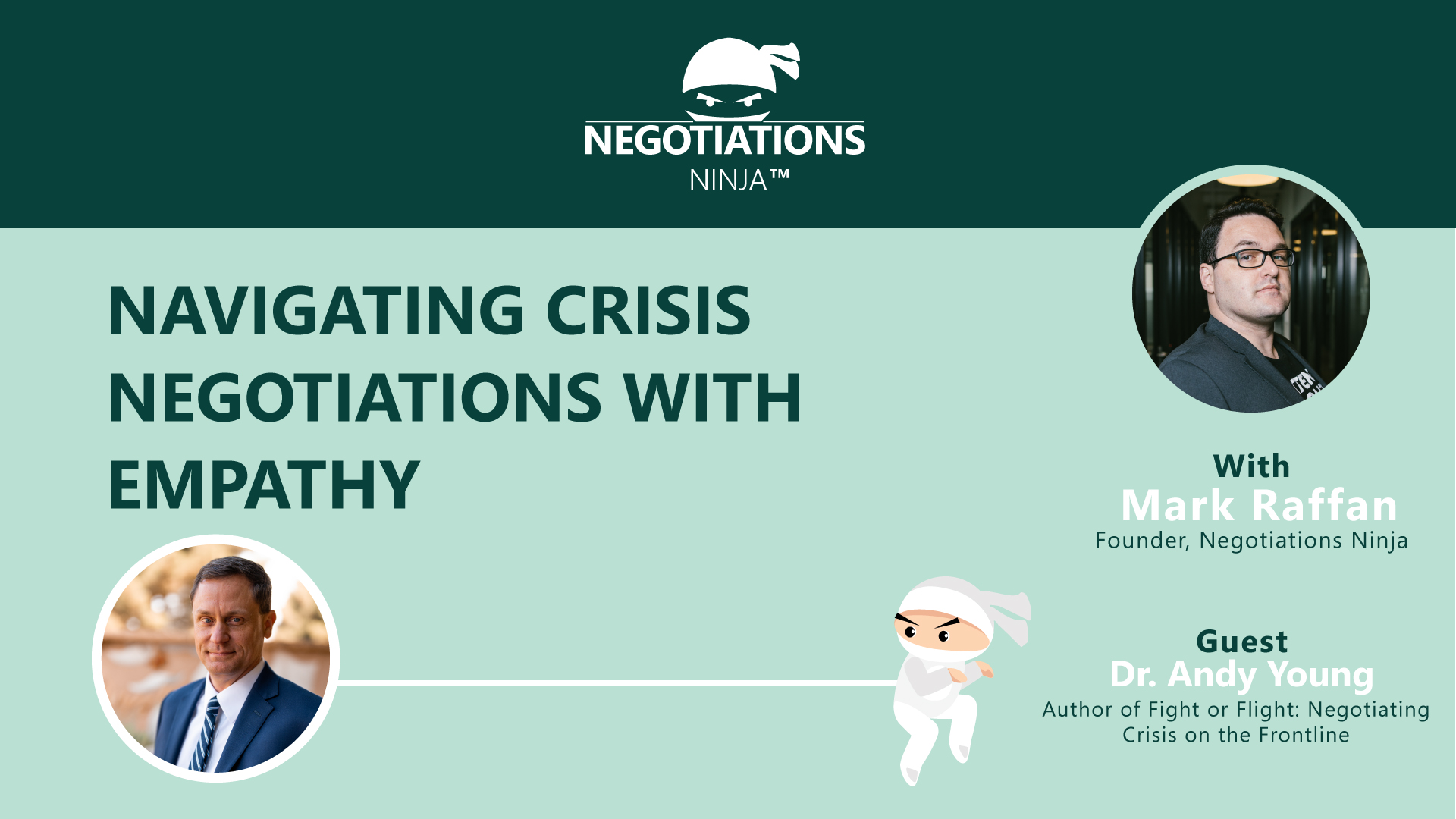How does crisis negotiation actually work? Dr. Andy Young has both trained and engaged in crisis negotiation for over 20 years. A common thread among these scenarios is the necessity of employing empathy for the counterparty regardless of what they’ve done. He explains why empathy in the face of crises is so impactful in this episode of Negotiations Ninja!
Outline of This Episode
- [2:02] Learn about Dr. Andy Young
- [3:05] The three types of crises Dr. Young sees
- [4:20] Comparing and contrasting business and crisis negotiations
- [8:10] Dr. Young’s approach to crisis situations
- [11:51] Dr. Young’s role in hostage negotiations
- [13:41] The role of power dynamics in hostage negotiations
- [16:58] Mental exercises to reestablish perspective
- [17:58] What to do when it’s clear there isn’t a “win”
- [20:09] The #1 thing the business world can learn
- [22:56] How to get your hands on Dr. Young’s book
Comparing and contrasting business and crisis negotiations
In the crisis world, there is no foundation of value generation and trust. The people being negotiated with are often irrational, and crisis negotiations tend to be adversarial.
In both crisis and business negotiations, each negotiator is working with someone different from them. While less extreme in the business world, the commonality is that two different perspectives have to work together. So you have to work to understand each other.
Crisis negotiators have developed empathy that you don’t typically see in business negotiations. Empathy is required to gain any traction. In the business world, you can create a relationship over time (through conversations, meals, activities, etc.). But in the crisis world, rapport-building must happen instantly.
Dr. Young does on-scene crisis counseling. It’s not unusual for him to get a call at 3 am to walk into a stranger’s house on the worst day of their lives. Every person in that horrible circumstance needs something different. You have to connect with the individual based on where they are.
In the business world, a relationship built over time sets the foundation for what you’re trying to accomplish. In crisis negotiations, that timeline must be accelerated. You don’t have shared experiences. You are simply sharing that moment with them and figuring out your role.
Dr. Young’s approach in crisis situations
Dr. Young notes that how you respond depends on the scenario you find yourself navigating. Dr. Young often sits in silence with crisis counseling. In a hostage negotiation, the circumstances drive the conversation.
When he’s involved in a crisis negotiation and speaking with a counterparty, he describes the circumstances as he understands them and asks the other person if they view the situation the same way. The goal is to get on the same page about the current reality.
As they start to unpack their perspective, you have to honor it while trying to find ways to create rapport so they can understand the other perspective. But if you start by sharing your perspective, it rarely works and will backfire quickly.
People may not have the patience to summarize what’s happened before your conversation. But when they can summarize it, it can lead to a conversation and allow you to develop empathy.
The #1 thing the business world can learn from hostage negotiators
Business negotiators tend toward being impatient. We assume that both parties are in it to get to a deal. So when someone acts irrationally, it’s unexpected, which leads to impatience and, inevitably, conflict. Crisis and hostage negotiators have to be patient, which is something that has to be learned.
In their day-to-day life, a patrol officer shows up, fixes whatever problem they’re facing, and moves on to the next problem. If it requires more than that, it’s outside of the norm, and it’s frustrating. So Dr. Young teaches new negotiators to shift their mentality.
Learn more about how crisis negotiators employ empathy in the face of real danger in this episode of Negotiations Ninja.
Resources & People Mentioned
- Episode #120: Learning from Failed Negotiations with Terrorists
Connect with Dr. Andy Young
Connect With Mark
- Follow Negotiations Ninja on Twitter: @NegotiationPod
- Connect with Mark on LinkedIn
- Follow Negotiations Ninja on LinkedIn
- Connect on Instagram: @NegotiationPod




